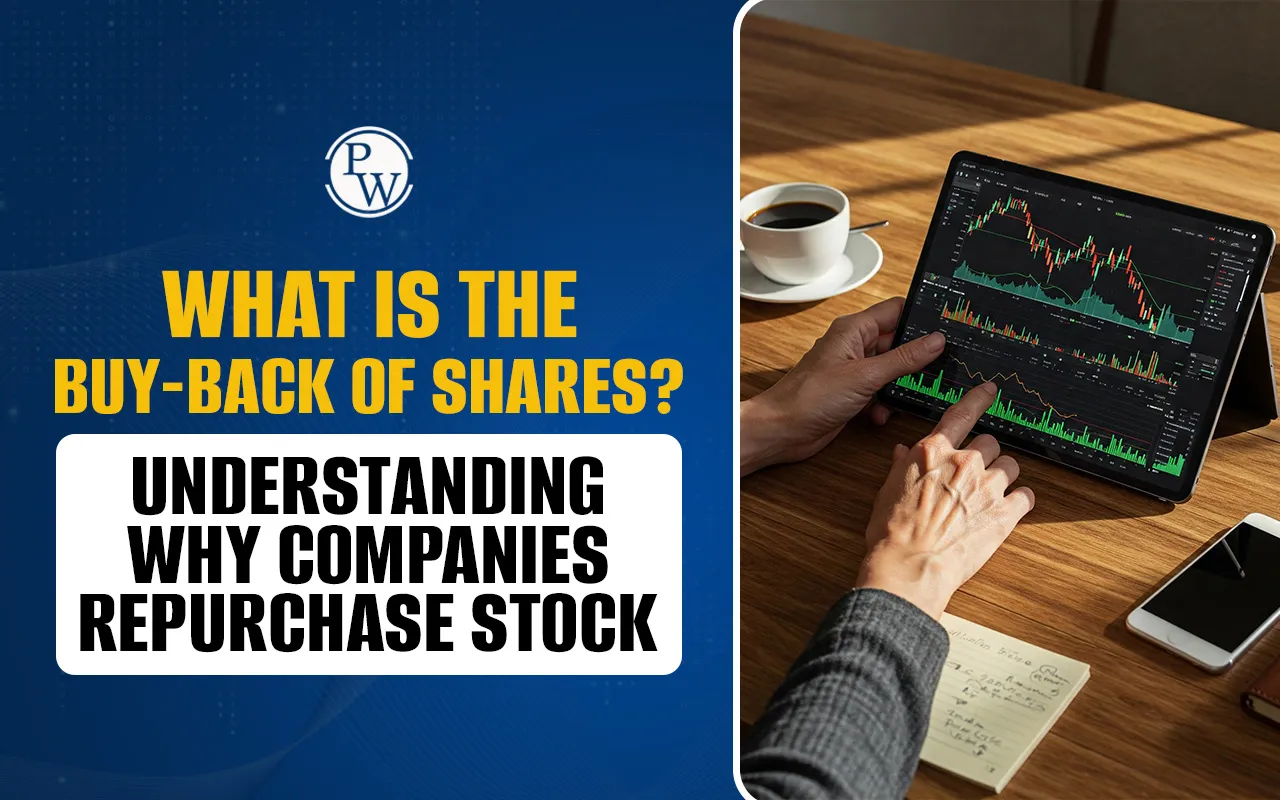
Buy-back of Shares is when a company opts to buy back its own shares from current shareholders. Typically, when a company repurchases these shares, they get cancelled, which means there are fewer shares available in the market. Consequently, each remaining share now holds a larger stake in the company. This can potentially boost the value of those shares. Companies often pursue this strategy to enhance the appeal of their shares, make smart use of surplus funds, or prevent others from gaining excessive control. It also signals that the company is confident in its future performance and growth. All in all, it's a strategic move that can offer various benefits for both the company and its shareholders.
Buy-back of Shares refers to a company acquiring its own shares from current shareholders. Following the repurchase of these shares are voided and no longer exist. This decreases the overall share count, which may result in various impacts on the company’s finances. A frequent result is a rise in the value of each remaining share as the company’s earnings are now distributed among a smaller number of shares. It may also indicate that the firm possesses robust financial stability and lacks superior investment options for its excess capital. Additionally, repurchase might be executed to hinder others from gaining excessive control over the firm, as there are fewer shares available to the public. In general, stock repurchases are a favored approach for firms to recognize their capital and demonstrate confidence in their business performance.
Stock BuyBack definition means a company buys back its own stock from its shareholders. When this happens, the number of shares in the market goes down. With fewer shares available, the profit is spread over fewer shares. This can increase the earnings per share and make each share more valuable.
The meaning of Share Repurchase is a kind of Buy-back of Shares, where firms acquire their own stocks from current shareholders. This is one method for a business to return funds to its shareholders. Rather than distributing profits as dividends, the company utilizes its resources to repurchase shares. The repurchased shares are subsequently canceled, diminishing the overall number of shares available in the market. With a reduced number of shares, the worth of each existing share might rise.
Let us look at the main reason why companies do the Buy-Back of Shares:
When a company repurchases its own shares, it decreases the total shares available in the market. This may boost the worth of the other shares. It also conveys that the company is robust and has faith in its future.
Also Check: Social Stock Exchange
Companies can use different ways to fund the Buy-Back of Shares:
When a company uses free reserves to buy back, the law requires it to transfer an equal amount to something known as the Capital Redemption Reserve (CRR). This ensures that the capital structure of the company remains balanced and that the rights of creditors are protected, even though the total number of shares is reduced.
There are rules companies need to follow during the Buy-Back of Shares:
A significant reason for the Buy-Back of Shares is to enhance EPS. As the total number of shares decreases, the company’s profit is now distributed among a small number of shares. This results in a higher EPS.
Firms can repurchase shares at a price above(premium) or below(discount) their nominal value. If they repurchase shares at a premium, the additional amount is deducted from the Securities Premium Account.
Accounting for the Buy-Back of Shares includes several important steps that ensure proper record-keeping and compliance with legal rules:
Selling Investments to Raise Money: Companies may sell some of their assets or investments to get the funds needed for a buyback
Recording Profits or Losses on Sale: If the sale of an Investment leads to a profit or loss, it must be properly recorded in the company’s books.
Cancelling Bought Back Shares: Once the shares are repurchased, they are cancelled, and the company’s share capital is reduced.
Adjusting Reserve, like CRR or Securities Premium: Companies must shift the right amount to the Capital Redemption Reserve or deduct from the Securities Premium Account, depending on how the buyback is funded.
Also Check: Digital Innovation and Evolving Role of Company Secretaries
The Buy-Back of Shares gives many benefits:
Boosts confidence in the company: When a company buys back its own shares, it signals trust in its financial strength and future performance.
Increases EPS: Since fewer shares remain in the market, the company’s earnings are divided among fewer shareholders, raising the Earnings Per Share.
Helps in better use of idle cash: Instead of keeping unused money, companies can use it for buybacks, which adds value to shareholders.
Stops hostile takeovers: By reducing the number of available shares in the market, companies can make it harder for outsiders to gain control.
Strengthens ownership control: Buybacks can increase the percentage of ownership for existing shareholders, giving them more say in company decisions.
When a Buy-Back of Shares occurs, shareholders have options. They can choose to sell their shares back to the company or retain them. If they maintain their position, they could gain from increased share value in the future.
The repurchase of shares is a method used by companies to regulate their capital. It enables them ti reward investors, prevents acquisition, and conveys a sense of financial stability. Regardless of whether purchased at a premium or discount, the objective is to enhance the organization’s financial position
Understanding the definition of Stock Buy-Back, the meaning of share repurchase, and the implications of a company purchasing its own shares allows us to understand the overall scenario.
| Related Links | |
| CSEET | CSEET Registration |
| CSEET Exam Date | CSEET Syllabus |
| CSEET Exam Pattern | CSEET Admit Card |
| CSEET Result | CSEET Preparation |
| CSEET Eligibility Criteria | CSEET Exam Centres |
